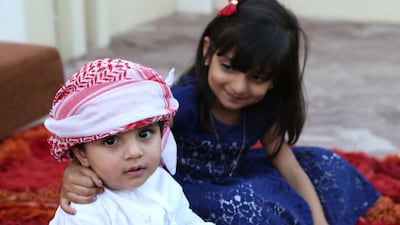ABU DHABI // Fatima Al Blooshi wishes she could turn back time to when she was first told that she and her fiance were thalassaemia carriers.
She would not have got married – and she certainly would not have become pregnant.
For what made the 26-year-old Emirati go through with the marriage five years ago – whether it was love or pressure from family and friends – all seems trivial when she lays her eyes on her four-year-old daughter Hussa.
“When we did the blood test before marriage and it showed that we both were carriers,” she recalls. “A judge in Ajman advised us not go through with the marriage and asked us to seek medical advice.”
The couple did not heed warnings that the chances of them conceiving a child with thalassaemia were very high. “We depended on God and thought that no one in the family had thalassaemia so there was no way our baby would get it,” she says.
They were so confident of their decision that two months after the wedding, when Mrs Al Blooshi became pregnant, she did not take any tests to determine whether the baby had thalassaemia or not.
“We had completely forgotten about it,” she says. Only during a routine vaccination when Hussa was two months old did doctors notice her daughter’s pale complexion and undertake a blood test.
“They found her haemoglobin level was seven and that her iron count was unusually high,” says Ms Al Blooshi.
Hussa was soon diagnosed with thalassaemia major and had to have her first blood transfusion.
“We felt like criminals. How could we have done this to our baby girl?” says Ms Al Blooshi.
Now four years old, Hussa requires blood transfusions every three weeks and medication five times a week, which is administered by a needle kept for 12 hours under her skin.
Ms Al Blooshi says there is no greater pain than seeing her daughter go through this almost every day and knowing that she, as her mother, is responsible.
This pushed her to resort to PGD – a procedure to identify genetic diseases within embryos created through in vitro fertilisation.
“I wanted to save my angel,” she says.
The only cure for thalassaemia is stem cells and bone marrow transplants through a matched donor, so Ms Al Blooshi decided to have another baby.
In 2014, after a year of tests at HealthPlus fertility centre in Abu Dhabi, she had her first successful in vitro sample. “I had eight fertilised babies but only two were healthy,” says Ms Al Blooshi.
The two healthy embryos turned out to be thalassaemia carriers so Mrs Al Blooshi asked that they be destroyed. “It was very hard but my aim was to have a match for Hussa.”
Her second successful attempt was a few months later with 28 fertilised eggs.
“Out of the 28, only one was healthy and a perfect match,” she says. On August 8, 2014 she was taken for implantation and nine months later, on April 22 last year, baby Theyab was born.
“We were ecstatic. Theyab was healthy and just to be sure, I had him tested again and he turned out to be a perfect match,” says Ms Al Blooshi.
The umbilical cord blood cells were harvested immediately after the delivery to be used to treat Hussa a year later.
“We hope to travel to the US for a stem cell transplant in August. By then Theyab will be a year and four months,” she says.
The cord blood cells will be sufficient for treating Hussa, however the procedure might also require bone marrow from Theyab.
“When Theyab grows up and understands how much his sister has suffered, I am sure he will be proud to have saved her life,” she says.
Ms Al Blooshi’s advice is not to get married if both spouses are thalassaemia carriers.
“It surprises me when I see couples who are carriers continue to have children naturally,” she says. “They refuse to do PGD and some even refuse to allow their sick children to undergo transplants.
“They would rather see their child have blood transfusions and be on medication for the rest of their lives than treat them. It’s easier for me to see my baby suffer through one operation than for the rest of her life.”
At four years old, Ms Al Blooshi says her daughter raises her hands in prayer when it rains. “This makes me weep. She raises her tiny hands up and prays to God to heal her and make her better,” she says. “She’s four. She should be out playing with her friends. She’s spent most of her life in hospitals – all because of my selfishness.”
salnuwais@thenational.ae

